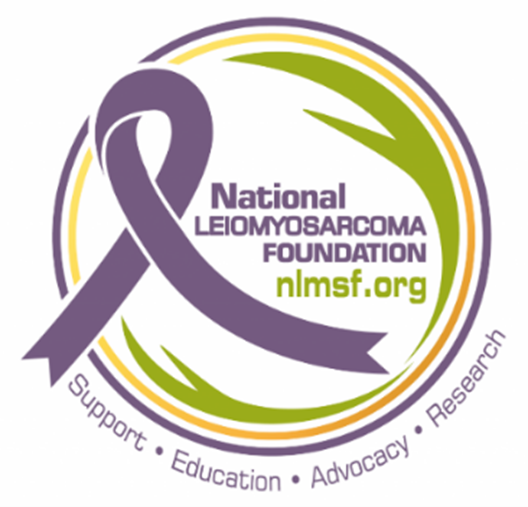National Leiomyosarcoma Foundation

The National Leiomyosarcoma Foundation (NLSF), since its inception in 2001, has continued to provide important resources, information assistance, advocacy, representation, and research support to advance/accelerate patient outcomes in diagnosis, and treatment. Continuous, annual research support for leiomyosarcoma (LMS) basic and translational research supports young investigators interested in sarcoma, especially leiomyosarcoma, as it is one of three larger patient-populated sarcoma subtypes. The Foundation coordinates virtual and on-site patient/family education programs to build awareness of the disease in global communities - USA, Canada, Europe, and Asia.
The Foundation supports the patient and research community by having initiated:
· THE INTERNATIONAL LMS RESEARCH ROUNDTABLE – 140 MEMBERS
Four Workgroups working throughout the year on basic and translational research to impoact clinical trial design
in areas of:
- Cell Line development - to authenticate the best of donated tumor tissue by patients to ensure accuracy of research going forward
- Collaborating with the Broad Institute of MIT/Harvard, the Koch Research Institute, and the Rare Cancer Research Foundation
- Proteomics / Multi0-mics included in this workgroup as well - biological analysis approach in which the data sets are multiple "omes", such as the genome, proteome, transcriptome, epigenome, metabolome and microbiome..
- Gynecological Oncology - working on uterine LMS challenges in research to advance treatment options
- Clinical Trials- tracking Unmet Needs in Treatment of LMS and Clinical Trials - two publications came from this workgroup in cancer journals
- and can be found here:
- Imaging Strategies / Radiomics - Establishing imaging modalities to discover a malignancy prior to a biopsy - especially valuable for uterine leiomyosarcoma.
- Radiomics is included in this. Radiomics is a rapidly evolving field of research concerned with the extraction of quantitative metrics the so called radiomic features—within medical images. Radiomic features capture tissue and lesion characteristics such as heterogeneity and shape and may, alone or in combination with demographic, histologic, genomic, or proteomic data
Co-Founder of the Sarcoma Coalition – 34 sarcoma patient advocacy groups collaborating to impact patient treatment outcomes: https://sarcomacoalition.us/
Three websites providing information on research updates / clinical trials, patient-driven research efforts through tumor donation. Initial steps for newly diagnosed patients in finding a sarcoma center of excellence; questions to ask at appointments;
· LMS LIFELINE BUDDY PROGRAM – peer-to-peer patient matching for one – on one support, including caregiver matching coping support;
· Genomic tumor profiling information, pathology, and treatment information guidance;
· LMS LIVE- CONNECTION - Research in Review quarterly series for patients to learn and ask questions about current research initiatives;
· Monthly virtual Patient information sessions with research clinicians
· Annual onsite patient/family programs at sarcoma centers
· Clinical Trial Patient Perspectives Bi-Monthly meetings to discuss experiences, and provide tips on questions asked about clinical trials
· Connect with a Clinician Program- for general questions to be answered for patients inquiring on coping with side effects
· Survivorship Care Planning information/guidance for patients and caregivers (podcasts, handout materials);
· Caregiving guidance throughout the patient’s cancer journey (Podcasts, handout materials);
· Family Support for grieving, depression, anxiety, and communication among family members to cope.
· Collaborative partnership building with organizations and other foundations – general cancer groups/sarcoma groups such as the Broad Institute of Harvard/MIT; Koch Research Institute to advance research in authenticating tumors for cell line development; RNA sequencing, CRISPR screening for repurposing drug testing;
· Patient Data collection collaboration through the Dana Farber COUNT ME IN PROJECT, the NCI MYPART NETWORK, and the RARE CANCER RESEARCH FOUNDATION for tumor tissue collection for the Broad and Koch Institutes;
· Annual research grant awards for the most promising LMS - specific research.
The Foundation is in need of funding assistance to enhance its information assistance and support programs to advance the need for educating the patient community to be their own best advocates in their care – whether it be at the time of initial diagnosis, in treatment, or after treatment. Enhancing quality of life after treatment is important for patients and caregivers, especially since the recurrence of the disease is so prevalent.
The average progression-free survival is only up to 5 years from the initial diagnosis. The average age of onset used to be 58,5 years of age but younger patients are being seen now, young adults, and even children have been diagnosed with LMS. Additionally, the misdiagnosis rate for this disease is between 30+%.
Annual funding support to continue to provide, and expand our programs would be helpful to our small foundation. Assistance with our website (to combine all three websites into one and update) would be most helpful, including funding for ad campaigns for patient outreach into community settings.
Thank you for allowing the NLMSF to provide this information to PTC for possible operational funding support consideration. We are 100% rated foundation under CHARITY NAVIGATOR, wih very low administrative operating costs, no paid staff, and over 90% of all donations directed to the research project commitments of the Foundation throughout each year.
Annie Achee, President
National Leiomyosarcoma Foundation
annieachee@aol.com
The National Leiomyosarcoma Foundation: http://www.nlmsf.org
NLMSF Research Information: http://leiomyosarcoma.info: https://leiomyosarcoma.info/
NLMSF LifeChange – Navigating a New Normal: https://nlmsflifechange.com/
Latest from National Leiomyosarcoma Foundation
Caregivers Are The ‘Mouthpiece’ For Patients in Clinical Trials
March 21, 2024
Article
One expert explains how caregivers are a vital part of the care team during a clinical trial.
